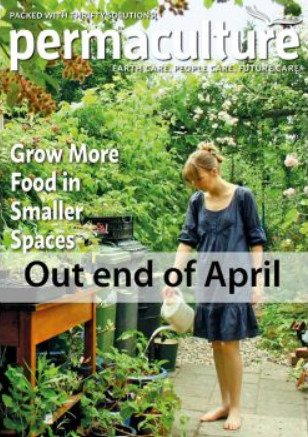Crenshaw Cru Featured In Permaculture Magazine
Adam wrote an article this winter for Permaculture Magazine about Crenshaw Cru, and it’s out this month in their summer edition!
What Is A Vineyard?
Crenshaw Cru is the name we’ve given to our home in Los Angeles where we’ve converted yards into perennial gardens. The vineyards we planted in the front and back yards are the Centralas estate vineyards, but we don’t like the term “vineyard.”
When most people think of the term “vineyard” they think of orderly rows of manicured vines. They think of a system for extracting grapes from the earth for wine. They think that a vineyard ends at the edge of the rows of vines.
It doesn’t.
We see a vineyard as an ecosystem. It’s an integration of vines into a diverse landscape that functions as a networked and supportive system of resilience and vitality, with as much going on below the earth as above it. The human and extra-human community are part of that ecosystem.
So we refer to Crenshaw Cru as a “winegarden” rather than a vineyard, because it evokes a different approach to seeing winegrowing.
As our approach to seeing a vineyard differently developed, so did our sense of what “viticulture” means. Again, the idea of viticulture seems too narrow to encompass the holistic approach that we think makes the best wine… and the best world.
We realized a few years ago that what we were doing was actually echoing the ideas and practices of indigenous populations who tended this land as their home garden for millennia before the arrival of capitalist Europeans with their vision of nature (and human non-Europeans) as free resources to be extracted and exported for profit.
As the children of this culture have begun to rediscover these pre-capitalist ways of living, we incorporated (some might say appropriated) and codified some of this as an agricultural system called permaculture.
What is permaculture?
The shortest definition may be that permaculture is a form of agriculture that has no expiration date. A longer version is that it is a way of providing for an abundant life that is scientifically grounded, self-sustaining, and self-regenerating, based on the ethics of “earth care, people care, fair share” and founded on indigenous knowledge and practices.
Permaculture is actually a much larger, or more holistic, concept than mere agriculture. The principles of permaculture do not strictly apply to growing plants. For example, one of the principles is “Produce no waste,” and another is “Use and value diversity.”
When we call Crenshaw Cru a permaculture winegarden, we are also including our business operations. That’s why we use the lightest, locally made bottles available, closures that won’t produce cork taint or otherwise allow for wine to go to waste, no foils or decorative waxes on the bottles, shipping materials made from post-consumer recycled cardboard, and work with organic vineyards or foraged fruit within two hours from our home.
To learn more about how the indigenous people saw and cared for this garden we call California, check out the book Tending The Wild, by M. Kat Anderson.
If you don’t know much about permaculture, check out the Permaculture website. It’s a great resource for learning more. And if you get the Summer 2022 edition, you might learn something new about Crenshaw Cru too.
